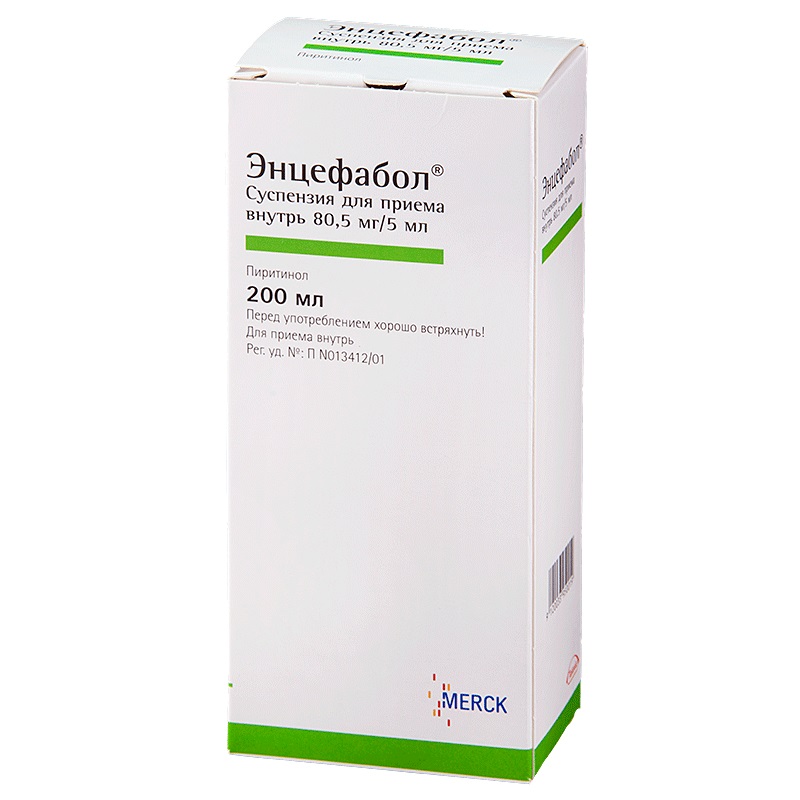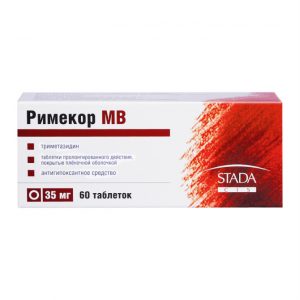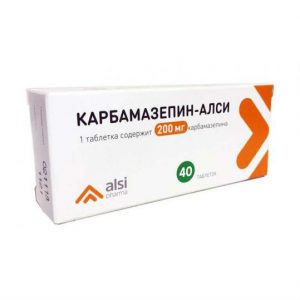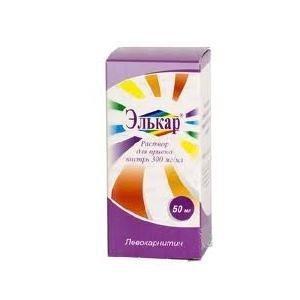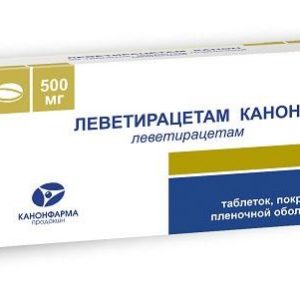Description
Release form
Suspension for oral administration
Packing
Bottle 200 ml.
Pharmacological action
Encephabol is a nootropic drug. Pyritinol increases pathologically reduced metabolism in the brain by increasing the uptake and utilization of glucose, increases the metabolism of nucleic acids and the release of acetylcholine in the synapses of nerve cells, and improves cholinergic transmission between cells of the nervous tissue. Helps stabilize the structure of the cell membrane of nerve cells and their function by inhibiting lysosome enzymes, thereby preventing the formation of free radicals.
Pyritinol improves the rheological properties of blood, increases the plasticity of red blood cells by increasing the ATP content in their membrane, which leads to a decrease in blood viscosity and improved blood flow. Pyritinol, improving blood circulation in ischemic areas of the brain, increases their oxygen supply and increases glucose metabolism. As a result, memory indices improve and disturbed metabolic processes in the nervous tissue are restored, which contributes to the full functioning of its cells.
Pharmacokinetics
Pyritinol is rapidly absorbed by oral administration. Bioavailability averages 85% (76-93%). The maximum plasma concentration is reached 30-60 minutes after ingestion of 100 mg of pyritinol. The elimination half-life is about 2.5 hours.
Pyritinol metabolizes rapidly. 20-40% of the substance reversibly binds to plasma proteins. The following substances were identified as the main metabolites: 2-methyl-3-hydroxy-4-hydroxymethyl-5-methylmercaptomethylpyridine and 2-methyl-3-hydroxy-4-hydroxymethyl-5-methylsulfinylmethylpyridine. Conjugated metabolites are excreted mainly through the kidneys. The total urinary excretion within 24 hours is 72.4-74.2%. Most of the dose received is excreted during the first 4 hours after administration. With feces, only 5% of the dose is excreted.
With repeated oral administration, cumulation is not observed. Toxic concentrations do not develop even with impaired renal function.
Penetrates through the blood-brain barrier, metabolites accumulate mainly in the gray matter of the brain.
Pyritinol crosses the placental barrier. Studies have not revealed teratogenic or embryotoxic activity.
Indications
Symptomatic treatment of chronic brain disorders in dementia syndromes with the following leading symptoms: impaired memory, concentration ability and thinking, fatigue, lack of motivation and motivation, affective disorders.
Primary degenerative dementia, vascular dementia and mixed forms.
Symptomatic therapy of chronic mental disabilities.
Post-traumatic encephalopathy.
Cerebral atherosclerosis.
Effects of Encephalitis.
Delayed mental development, cerebrosthenic syndrome, encephalopathy in children.
Contraindications
Absolute: hypersensitivity to pyritinol.
Relative: a history of kidney disease, severe hepatic impairment, marked changes in peripheral blood picture, acute autoimmune diseases, such as systemic lupus erythematosus, myasthenia gravis, pemphigus.
Use during pregnancy and lactation
If you need to use Encephabol during pregnancy or during lactation (breastfeeding), you should correlate the expected benefits to the mother and the potential risk to the fetus or baby.
Pyritinol crosses the placental barrier, in small amounts excreted in breast milk.
In experimental studies, the presence of teratogenic or embryotoxic effects of pyritinol has not been established.
Special instructions
In patients with rheumatoid arthritis and other chronic joint diseases, there is an increased sensitivity to compounds that include the SH-group, including to pyritinol. These patients have an increased risk of hypersensitivity reactions, immunopathological reactions, as well as impaired taste sensitivity and liver function. When treating this category of patients, a systematic monitoring of general blood, urine, liver, and immunological parameters is necessary.
Hypersensitivity reactions to the drug may occur in patients with hypersensitivity to D-penicillamine, since the latter has similarities with pyritinol in chemical structure (thiol groups).
When using Encephabol according to indications, as a rule, there are no restrictions for those activities that require increased attention, rapid psychomotor reactions. However, given the likelihood of individual differences in the response of individual patients to the drug, at the beginning of treatment and with an increase in dose, the possibility of a violation of the rate of psychomotor reactions should be taken into account.
Composition of
5 ml of suspension (1 teaspoon) contain:
active ingredient: pyritinol – 80.5 mg
excipients: sodium saccharinate dihydrate, propyl parahydroxybenzoate, methyl parahydroxybenzoate, citric acid monohydrate, potassium monohydrate, potassium monohydrate, potassium monohydrate, special natural essence, povidone, colloidal silicon dioxide, hydroxyethyl cellulose, glycerin 85%, sorbitol solution 70%, purified water.
Dosage and administration
Take with or after meals. For sleep disorders, the last daily dose should not be taken in the evening or at night.
Adults – 2 teaspoons of the suspension 3 times a day (600 mg of pyritinol dihydrochloride monohydrate per day).
Newborns – from the 3rd day after birth, 1 ml suspension per day for a month, the dose is taken in the morning. Starting from 2 months after birth, this dose is increased by 1 ml every week until the daily dose reaches 5 ml (1 teaspoon).
Children from 1 year old – 1/2 to 1 teaspoon of suspension 1-3 times a day (from 50 to 300 mg of pyritinol dihydrochloride monohydrate per day, depending on indications).
Children from 7 years old – 1/2 to 2 teaspoons of the suspension 1-3 times a day (from 50-100 to 300-600 mg of pyritinol dihydrochloride monohydrate per day, depending on the indications).
The duration of treatment depends on the clinical picture of the disease. As a rule, therapeutic success is achieved after 3-4 weeks of treatment. The optimal effect usually occurs after 6-12 weeks. The duration of treatment should be at least 8 weeks, and if necessary, it can be continued. In newborns with a high risk of perinatal CNS pathology, the average duration of treatment is an average of 6 months. After 3 months, you should check for indications for further treatment.
Side effects
When taking Encephabol in accordance with the indications and at the recommended doses, side effects should not be expected.
Sometimes – hypersensitivity reactions of varying severity: rashes on the skin or mucous membranes, itching, nausea, vomiting, diarrhea, fever, sleep disturbance.
Rarely – irritability, loss of appetite, headache, dizziness, fatigue, change in taste, impaired liver function (increased levels of transaminases, cholestasis).
Drug Interactions
With the simultaneous use of Encephabol, it can potentiate the side effects of penicillamine, gold preparations, and sulfasalazine. No clinically significant interaction of Encephabol with other drugs has been established.
Overdose
Symptoms: increased side effects.
Treatment: gastric lavage, activated charcoal appointment. If necessary, conduct symptomatic therapy.
Storage Conditions
The product should be stored at a temperature not exceeding 25 ° C.
active substance
Pyritinol
Terms leave through pharmacies
In retseptu
Dosage form
suspension for ingestion
Merck KGaA, Russia
